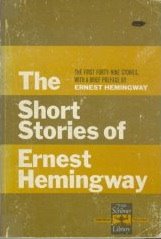 As long as the title is, the short stories in this collection are exactly that. Short. Not to say they don't have power. Less is more, right? I have put off reading Raymond Carver's stories for a long time. For some reason or another, he has eluded me, but I could hold out no more. It's a tiny book that will disturb you, hold you, grip you, and leave you, at times, utterly dumbfounded.
As long as the title is, the short stories in this collection are exactly that. Short. Not to say they don't have power. Less is more, right? I have put off reading Raymond Carver's stories for a long time. For some reason or another, he has eluded me, but I could hold out no more. It's a tiny book that will disturb you, hold you, grip you, and leave you, at times, utterly dumbfounded.Each of the seventeen stories in this collection is about love in some way, and most of them, wait, no, all of them, have negative connotations or involve negative circumstances. The string that ties these stories together are the differing perspectives of love, of relationships in moments of crisis, from seventeen different angles. From the poor choices of one partner in The Calm to a man so fed up he's put all his furniture on the front lawn in Why Don't You Dance?. The title story promises a glimpse into relationships and shows us how shallow and crass we can be, we expect deep discussion about love and its meaning and get an inquisition into one character's loyalty to a former, abusive lover. And my favorite, So Much Water So Close To Home, involves a man whose wife is angry at him to the point of leaving him because he and some friends discovered a corpse at the beginning of a camping trip and decided not to notify the authorities until the trip was over, thinking the corpse wasn't going anywhere and there's no sense ending the trip early if it would all be the same in a few days.
Carver's strength lies in his ability to pose questions. He dangles the truth just out of our sight and never gives it to us, demanding that we decide the relevance. Most of his stories are vignettes of instances, each tableau raising its own questions, hanging there waiting to be answered; until everything turns symbolic and the stories become unique allegories, small metaphors like ink blots that depend on the reader's interpretation, different from person to person.
Carver's collection resonates because it's evocative. It succeeds because each story deftly illuminates a complex world where morals are fuzzy and emotions are unclear. Indeed, what we talk about when we talk about love isn't love most times, but something different entirely, something that hardly makes sense at all. And still we try. Still we try.
Don't judge this one by its cover - it's better than it looks.


1 comment:
I don't know what intrigues me more, this book or your description of it.
Thank you once again.
Post a Comment